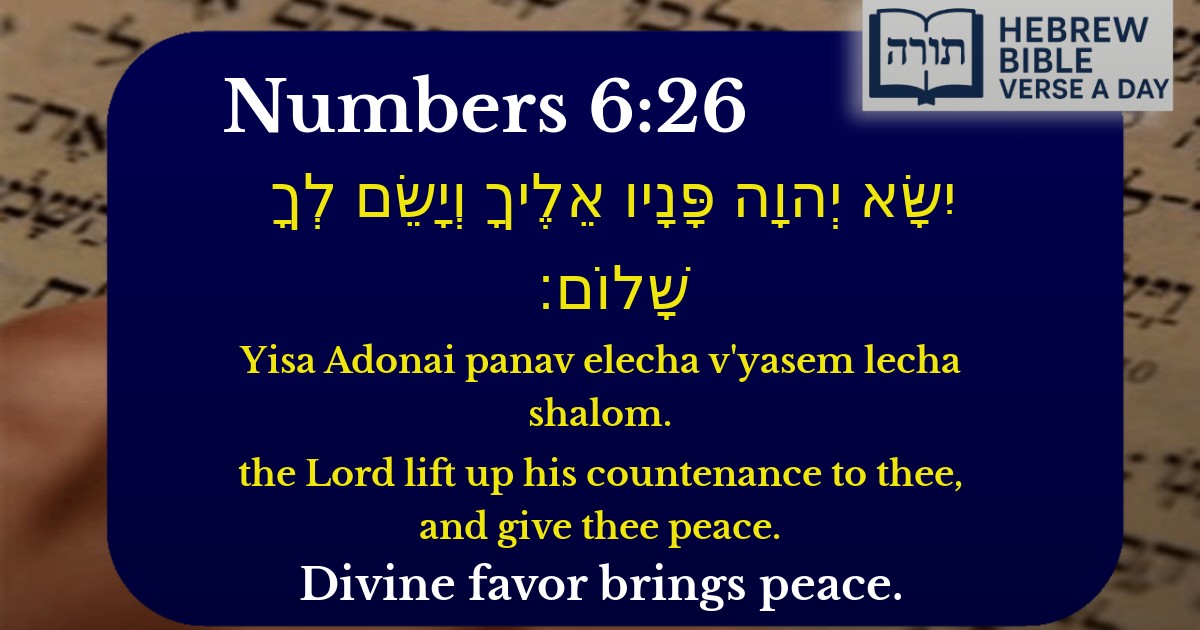Frequently Asked Questions
Q: What does 'the Lord lift up His countenance to thee' mean in Numbers 6:26?
A: According to Rashi, this phrase means that Hashem (God) will show you favor and grant you His grace. 'Lifting His countenance' symbolizes looking upon someone with kindness and acceptance. The Talmud (Berachot 20b) explains that this blessing assures us of divine goodwill when we follow His ways.
Q: Why is peace (shalom) mentioned at the end of the priestly blessing in Numbers 6:26?
A: The Rambam (Hilchot Tefillah 14:7) teaches that true peace (shalom) is the ultimate blessing because it encompasses all other blessings. Without peace, other blessings cannot be fully enjoyed. The Midrash (Bamidbar Rabbah 11:7) states that shalom is so precious that it is the vessel that holds all blessings, as without peace, nothing else can endure.
Q: How does the priestly blessing (Numbers 6:26) apply to us today?
A: The Kohanim (priests) still recite this blessing daily in Orthodox Jewish communities during the Amidah prayer (Duchening). Even when not recited by Kohanim, parents traditionally bless their children with these words on Shabbat. The Sforno explains that this blessing reminds us that true peace and divine favor come from living according to Torah values.
Q: What is the significance of the three-part structure of the priestly blessing (Numbers 6:24-26)?
A: The Talmud (Sotah 38a) teaches that each of the three verses corresponds to different blessings: protection, grace, and peace. The threefold structure also alludes to the three patriarchs (Avraham, Yitzchak, and Yaakov), as explained by the Zohar. The final blessing of peace in verse 26 represents the culmination and perfection of all blessings.
Q: Can anyone say the priestly blessing from Numbers 6:24-26, or only Kohanim?
A: While the actual priestly blessing with its special ceremony (nesiat kapayim) may only be performed by Kohanim, the text itself may be recited by anyone as a prayer or blessing. The Shulchan Aruch (Orach Chaim 128:1) specifies the precise laws of who may recite it and when, but parents commonly use these words to bless their children, showing the verses' enduring spiritual power.


Explanation of the Verse
The verse "יִשָּׂא יְהוָה פָּנָיו אֵלֶיךָ וְיָשֵׂם לְךָ שָׁלוֹם" (Bamidbar 6:26) is the concluding blessing of the Birkat Kohanim (Priestly Blessing). It conveys Hashem's ultimate benevolence and desire for peace upon the Jewish people.
Rashi's Interpretation
Rashi explains that "יִשָּׂא יְהוָה פָּנָיו אֵלֶיךָ" means that Hashem will suppress His anger and show favor to the individual, despite any sins they may have committed. This reflects the concept of hastarat panim (hiding of the Divine countenance), where Hashem grants grace even when strict justice might demand otherwise.
Rambam's Perspective
In Hilchot Tefillah U’Nesi’at Kapayim (14:7), the Rambam emphasizes that the Kohanim must recite this blessing with love and sincerity, as it channels Divine favor. The phrase "וְיָשֵׂם לְךָ שָׁלוֹם" signifies the completeness of all blessings, for without peace, no other blessing can be fully enjoyed (as stated in Orach Chaim 127:2).
Talmudic and Midrashic Insights
Kabbalistic Dimension
The Zohar (Naso 147b) explains that this blessing aligns the sefirot, bringing harmony between Chesed (kindness) and Gevurah</em (judgment), ultimately manifesting as שָׁלוֹם—the unification of opposites in Divine service.